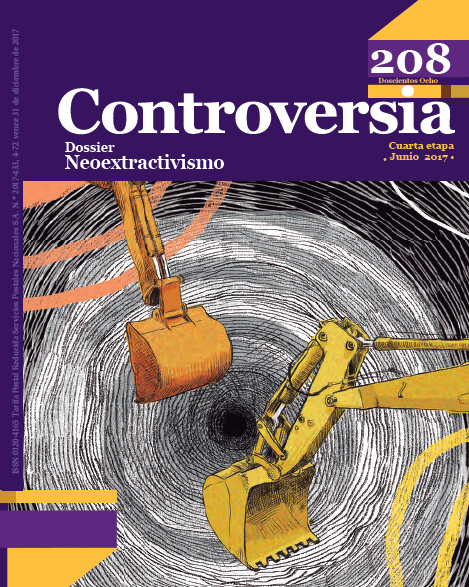Resumen
En este artículo se discuten las dificultades, tensiones y conflictos que emergen en la construcción de casos de violaciones a derechos humanos relacionadas con minería. El artículo se concentra principalmente en los retos que enfrentan abogados y activistas de derechos humanos Colombia. Entre esos retos se encuentran: 1) La relación entre derechos humanos y minería, que implican paradigmas jurídicos, políticos y epistémicos cualitativamente distintos y obligan a la reelaboración en las formas de trabajo de quienes participan en los casos; 2) las disputas concretas en torno al estatus de verdad de los datos que sustentan las pruebas y los argumentos jurídicos, políticos y morales; 3) las diferentes formas de la muerte, que deben ser capturadas a través de prácticas, epistemologías e instituciones que no siempre son las adecuadas.
Referencias
Agamben, Giorgio (1998). Homo Sacer: Sovereign Power and Bare Life. Trans. Daniel Heller-Roazen. Palo Alto: Stanford up, 3-18.
Asad, Talal (2000). What do human rights do? An anthropological enquiry. Theory & Event, 4(4), xx-xx
Auyero, Javier y Swistun, Debora (2007). Confused because exposed. Towards an ethnography of environmental suffering. Ethnography, 8(2), 123-144.
Berlant, Lauren (2007). Slow death (sovereignty, obesity, lateral agency). Critical Inquiry, 33(4), 754–780.
Bijker, Wiebe E.; Bal, Roland y Hendriks, Ruud (2009). The paradox of scientific authority: The role of scientific advice in democracies. Cambridge: MIT Press.
Brown, Phil (1992). Popular epidemiology and toxic waste contamination: lay and professional ways of knowing. Journal of Health and Social Behavior, 267-281.
Cerrejón (2016). Comentarios de Cerrejón al informe de Cinep Minería, Conflictos Agrarios y Ambientales en el Sur de La Guajira. Recuperado de https://businesshumanrights.org/sites/default/files/documents/Respuesta%20Cerrej%C3%B3n%20junio%2028%202016.pdf
Charters, Claire y Stavenhagen, Rodolfo (Eds.). (2009). Making the declaration work: The United Nations declaration on the rights of indigenous peoples. Copenhagen: IWGIA.
Douzinas, Costas (2000). The end of human rights: critical thought at the turn of the century. Oxford: Bloomsbury Publishing.
Edelman, Marc (2014). Linking the Rights of Peasants to the Right to Food in the United Nations. Law, Culture and the Humanities, 10(2), 196-211.
Fassin, Didier (2007). Humanitarianism as a Politics of Life. Public Culture, 19(3), 499.
Fiske, Amelia (2016). Evidence of Harm: Oil, Health, and the Environment in the Ecuadorian Amazon (Disertación Doctoral). University of North Carolina, Chapel Hill, 2016.
Ferry, Elizabeth Emma (2013). Minerals, collecting, and value across the USMexico border. Bloomington: Indiana University Press.
Foster, John Bellamy (2000). Marx’s ecology: Materialism and nature. Nueva York: NYU Press.
Graeber, David (2001). Toward an anthropological theory of value: The false coin of our own dreams. Londres: Springer.
Graeter, Stefanie (2017). To Revive an Abundant Life: Catholic Science and Neoextractivist Politics in Peru’s Mantaro Valley. Cultural Anthropology, 32(1), 117–148.
González Núñez, Denise (2014). Peasants’ Right to Land: Addressing the Existing Implementation and Normative Gaps in International Human Rights Law. Human Rights Law Review, 14(4), 589-609.
Jelin, Elizabeth (2003). State repression and the labors of memory. Minneapolis: University of Minnesota Press.
Keck, Margareth. E. y Sikkink, Katrhyn (2014). Activists beyond borders: Advocacy networks in international politics. Nueva York: Cornell University Press.
Latour, Bruno (2005). From Realpolitik to Dingpolitik or How to Make Things Public. En: B. Latour y P. Weibel, Making Things Public. Atmospheres of Democracy. (pp. 14-43).
Latour, Bruno y Woolgar, Steve (2013). Laboratory life: The construction of scientific facts. Princeton: Princeton University Press.
Li, Fabiana (2015). Unearthing conflict: corporate mining, activism, and expertise in Peru. Durham: Duke University Press.
Merry, Sally Engle (2006). Transnational human rights and local activism: Mapping the middle. American Anthropologist, 108(1), 38-51.
Mignolo, Walter D. (2009). Who speaks for the “human” in human rights. Hispanic Issues On Line, 5(1), 7-24.
Moore, Jason W. (2011). Transcending the metabolic rift: a theory of crises in the capitalist world-ecology. The Journal of Peasant Studies, 38(1), 1-46.
Moyn, Samuel (2010). The Last Utopia. Cambridge: Harvard University Press.
Nixon, Rob (2011). Slow Violence and the Environmentalism of the Poor. Cambridge: Harvard University Press.
Sassen, Saskia (2006). Territory, authority, rights: From medieval to global assemblages (Vol. 4). Princeton: Princeton University Press.
Smith, Neil (2010). Uneven development: Nature, capital, and the production of space. Athens: University of Georgia Press.
Theidon, Kimberly (2012). Intimate enemies: violence and reconciliation in Peru. Filadelfia: University of Pennsylvania Press.
Ticktin, Miriam I. (2011). Casualties of care: Immigration and the politics of humanitarianism in France. Los Angeles: University of California Press.
Verdery, Katherine (2003). The Vanishing Hectare: Property and Value in Postsocialist Transylvania. Nueva York: Cornell University Press.



